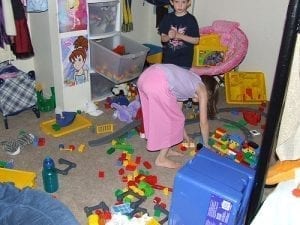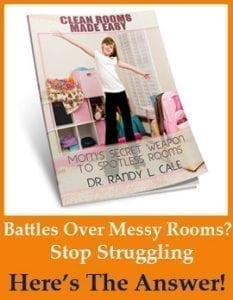“My kids just won’t pick up their stuff. What’s wrong with them?”
 A lot of parents say they can’t figure out how to teach their kids to clean their rooms without relentless nagging and threats. It’s a pretty simple lesson, based on the same principles behind many of the strategies discussed on this site. I keep repeating this because it’s important: Effective parenting requires you to change your behavior and then be patient while your children learn from their own choices and actions.
A lot of parents say they can’t figure out how to teach their kids to clean their rooms without relentless nagging and threats. It’s a pretty simple lesson, based on the same principles behind many of the strategies discussed on this site. I keep repeating this because it’s important: Effective parenting requires you to change your behavior and then be patient while your children learn from their own choices and actions.
Imagine that you’ve planted a garden, but despite your efforts, your garden is full of weeds. You decide to start again. You pull the weeds and plant new seeds. You water the new seeds. Do you expect a perfect garden after you water it for a day? A week? Two weeks? You keep watering, patiently, knowing that you’re doing the right thing to create a beautiful garden.
The same is true for nurturing healthy behavior in your children. First, you get rid of the weeds (nagging, lecturing, yelling, losing control, threatening, coercing) and then you water the garden (nurture healthy behaviors).
Endlessly nagging the kids and picking up is a daily, constant drain on your parental energy. It’s exhausting just keeping things relatively neat and clean.
Wouldn’t it be nice to count on the kids picking up most of their stuff – and putting it away?
There is a way to make it happen. I’ll offer you two approaches. The first approach is outlined below and involves a gradual, methodical shift on your part that will nurture healthy and responsible behavior. Your kids will learn to take more and more responsibility for their “stuff” – but it does take a while. Patience is key here.
The second approach is outlined in my new audio program, Clean Rooms Made Easy. You can read more about Clean Rooms Made Easy: Click Here.
However, let me first walk you through a way to get started that will begin the process of shifting responsibility for cleaning up.
Six Steps to Clean Rooms
1. Have a chat with the kids.
 Set up a family meeting. Tell the kids that you’re unhappy with the way things are going and there will be some changes. Don’t make it a lecture. It’s a simple statement. Outline the changes, as you see in these six steps. Tell them…
Set up a family meeting. Tell the kids that you’re unhappy with the way things are going and there will be some changes. Don’t make it a lecture. It’s a simple statement. Outline the changes, as you see in these six steps. Tell them…
2. “You’re responsible for cleaning your rooms. I’m done reminding you.”
You might be saying, “But, Dr. Cale…I’ve been telling them that for years.”Well, what’s new is that you’re going to stop reminding them or nagging them. Instead, you will allow them to take responsibility for their rooms. You will no longer nag, threaten, beg, or negotiate. Next, tell them…
3. “You’ll clean your room every Saturday morning before you do anything else.”
Not just this Saturday but every Saturday until they move out. (This is the “Work, then Play” principle applied once again. You should have read about that elsewhere on the website. Click Here to read more.) If they have a soccer game at 10:00 a.m. and haven’t finished cleaning their rooms, don’t rescue them. Stick to your commitment here!
Gently, with no emotion, point out that their work isn’t finished, so they’re not going to the soccer game yet. You have to be willing to let them experience the consequences of their choices.
Believe me, they’ll only miss a few minutes of a couple of games before they get it. It doesn’t have to be Saturday. What matters is that there’s a schedule and that you stick to your guns. No access to desired activities until the room is cleaned.
I can hear you now…
4. “But my kids will throw a fit!”
 If you’re saying this, you may be in trouble: your kids are likely driving the bus.
If you’re saying this, you may be in trouble: your kids are likely driving the bus.
Let them throw a fit – and don’t change your mind. You don’t have to rescue your children from their upsets. If you’re unwilling to let your kids be unhappy with your decisions, you’re powerless. You can’t make healthy parental choices based on your children’s approval. They’ll naturally go down the path of least responsibility, and this will not serve them. Let them be upset and stick to “work than play.” Next, it will be essential to …
5. Ignore their complaints and procrastination.
In the beginning, they may complain and try to negotiate their way out of cleaning their rooms. Ignore this. They may call you ugly names. Ignore this. They may throw tantrums at missing the big game. Ignore this. They may pretend that you never had the discussion and simply do nothing. Ignore this, too.
Ignore everything that’s not about getting the room cleaned! And then…
6. Seize the moment to notice when they’re doing any kind of clean-up.
Be vigilant and notice any kind of picking up – or taking responsibility for “their stuff.” While your daughter is picking up her room, stick your head in and smile. Talk about the soccer game. Comment on the weather. Stop by and say, “Thanks.”
Do this frequently in the early weeks, making sure to catch them while they’re cleaning – not afterward. This is where the magic comes in. All the other steps position you to do this one essential thing. Your attention is your true source of power. Continue for six weeks. As their cleaning becomes habitual (and it will) taper off and gradually reduce the number of times you engage them while they’re cleaning.
By the way: Don’t overdo it here. Too many words, too much thinking, too much melodrama about picking up will backfire. Instead, just focus on “engaging” the kids WHILE they are picking up, two or three times during each Saturday clean-up session.
 That’s it. This strategy will work if you’re consistent and stick to your guns. Expect a gradual learning curve and try it for six to eight weeks. You’ll be delighted with the results.
That’s it. This strategy will work if you’re consistent and stick to your guns. Expect a gradual learning curve and try it for six to eight weeks. You’ll be delighted with the results.
- Would you like faster results?
- How much easier would life be if this was a daily habit?
- Would you like to learn how to keep their rooms clean without reminders?
- How good would it feel to have the kids pick up as they go?
- What if you rarely had to remind them to pick up any of their stuff?
- What if you had a tool to help them organize their stuff?
- What if you could teach them to be responsible for all their toys, books, clothes, etc?
YOU CAN! Learn about the power of Clean Rooms Made Easy, and then you will have more time to enjoy your life – while the kids are learning to be more responsible in their lives. It can be done, and it can be done quickly!













